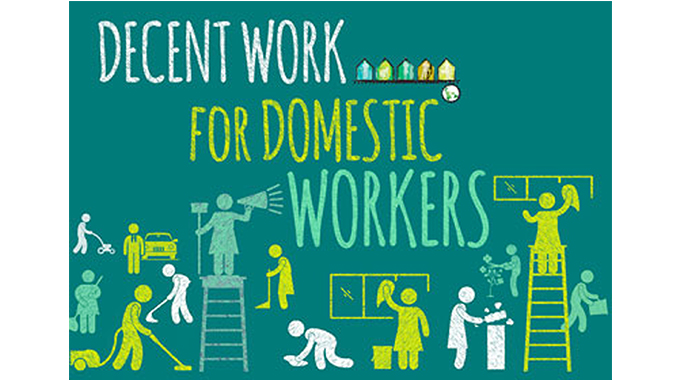Covid-19 and the burden of domestic work

Yoliswa Dube-Moyo
The International Labour Organisation (ILO) reports that one in 25 female workers in the world is a domestic worker.
Although a considerable number of men work in the sector – often as gardeners, drivers or butlers – it remains a highly feminised sector with 80 percent of all domestic workers being women.
Domestic workers often face very low earnings, disproportionately long hours, have no guaranteed weekly day of rest and at times are susceptible to physical, mental and sexual abuse or restrictions on freedom of movement.
According to the ILO, exploitation of domestic workers can partly be attributed to gaps in national labour and employment legislation, and often reflects discrimination along the lines of sex, race and class.
The Covid-19 pandemic has deepened the plight of domestic workers.
A significant number of domestic workers have lost their jobs primarily due to the economic vulnerabilities faced by their employers as a result of lockdowns imposed to help slow the spread of Covid-19.
Another chunk of domestic workers continues to work with little or no remuneration and no time off.
Part-time domestic workers are hardest hit as they cannot secure jobs because potential employers fret over them being carriers of the dreaded Covid-19.
“Before the beginning of the lockdown in March, I would make about US$140 from piece jobs. I had developed a good client base such that I had a job to do every day of the week,” said Mr Daimon Siachelaba, a part-time gardener struggling to secure constant work.
Mr Siachelaba made the great trek from his home in Binga to Bulawayo to seek better employment opportunities.
He was doing okay as a part-time gardener, managing to support his wife and five children back home before Covid-19 struck.
“I would charge US$5 or R100 per day. My employer for the day would cater for my transport fare, breakfast and lunch for the day I work on their yard,” said Mr Siachelaba.
On some days, he said, he would walk from his lodgings in Entumbane suburb into town and then catch a Zupco bus to wherever he would be working.
“This would help save some money. I still had to pay US$15 rentals for the room I stay in and feed myself a meal in the evening,” said Mr Siachelaba.
He continued: “Some of my employers were generous. In addition to the US$5, they would also give me cooking oil, sugar and soap – making my stay in the city more bearable.”
But now, Mr Siachelaba gets gigs few and far between, which has caused a huge financial strain for him and his family back home.
“Whenever I have a bit of airtime, I call those who used to employ me and beg them for work. Even if they don’t have the money to pay me immediately, I accept credit. Phela imali imnandi malanga wonke. Also, I’m always grateful for the meals they give me – which may be all I eat on that day,” he said.
Covid-19 has been his biggest enemy as his employers are skeptical about him working for them considering he uses public transport and they are not sure of his behaviour when he is not on their yard.
“It’s been really hard for me. I have been surviving by the grace of God,” grumbled Mr Siachelaba.
Domestic workers have been among workers most affected by the Covid-19 pandemic. Their contribution to households has been immense, even while the pandemic has threatened their livelihoods.
Since the adoption of ILO Convention 189 on decent work for domestic workers, many countries around the world have worked to improve their protection but more needs to be done to ensure decent working conditions for them.
“I have not seen my family more than three times since the lockdown started. My employer has been very particular about following lockdown regulations. She has grudgingly allowed me out of the house after several lectures about being careful when I do go out,” said Miss Performance Zulu who is employed as live-in house help.
She said she was aware of the importance of adhering to the Covid-19 regulations but staying locked up was driving her crazy.
“Imagine having to go to work every day with no time off. There’s no way you can sit around and do nothing as long as you’re at your place of employment. It’s been really hard. I could use some fresh air here and there,” said Miss Zulu.
She said while her employer has been paying her dues in forex consistently over the months, time off work would go a long way in keeping her mental health in check.
“A change of environment is necessary. Employers should trust their employees to do the right thing when they’re away from work,” said Miss Zulu.
But that is not the only headache employers have to deal with. Most worry about the homes their workers will be visiting and whether or not they and their family members uphold the Covid-19 regulations.
It is a fight of trust and control. Will they continue to wash their hands regularly? Will they maintain a social distance, wear a mask consistently and sanitise often?
“It’s difficult to manage an adult. For now, the best thing is for everyone to stay at home. I’m still working from home and only leave when I need to go to the supermarket. Why must my helper feel oppressed when we’re all trying to be careful,” charged Mrs Amanda Ncube, a mother of two young children from Parklands suburb.
She said these were not ordinary times and pulling the abuse card was unnecessary.
“We need to all work together to fight this pandemic. We’ll visit all we like once all this is over. We don’t earn much ourselves but try to pay our domestic workers something meaningful, they should at least be grateful for that,” said Mrs Ncube.
The reverse may of course be true. Domestic workers may carry the coronavirus from their places of employment to their homes, putting their families at risk.
They, however, bear the biggest brunt being the weaker party in the scheme of things, forcing them to oblige their employers, which may be viewed as abuse on some level.
Domestic workers comprise a significant part of the global workforce in informal employment and are among the most vulnerable groups of workers.
They work for households, often without clear terms of employment, unregistered in any book, and excluded from the scope of labour legislation.
On average, domestic workers earn US$40 per month, depending on what their employer can afford.
Every day, tens of millions of people across the world clean other people’s homes, cook their meals and watch over their children.
Their work contributes to national economies and labour markets by enabling others to carry out their own jobs.
Yet, domestic workers very often lack recognition as real workers, and constitute one of the most vulnerable categories of workers.
Research shows that only about 10 percent of domestic workers are covered by labour legislation to the same extent as other workers, while more than 25 percent are completely excluded.
Physical violence, child labour and forced labour are among the human rights abuses affecting women and girls in domestic work.
However, abuses also include long hours of arduous work without rest and unfair pay practices.
“Domestic work is one of the oldest and most important occupations for many women in many countries. It is linked to the global history of slavery, colonialism and other forms of servitude. In its contemporary manifestations, domestic work is a global phenomenon that perpetuates hierarchies based on race, ethnicity, indigenous status, caste and nationality.
“Care work in the household is quite simply indispensable for the economy outside the household to function. The growing participation of women in the labour force, changes in the organisation of work and the intensification of work, as well as the lack of policies reconciling work and family life, the decline of state provision of care services, the feminisation of international migration and the ageing of societies have all increased the demand for care work in recent years,” reads and ILO Decent work for domestic workers report in part.
A growing number of countries are taking measures to improve the living and working conditions of domestic workers. But the momentum needs to be stepped up to ensure that domestic workers enjoy labour rights, just like other workers.
It is important that domestic work is considered as any other work with labour market institutions such as representative organisations, collective agreements, and regulated personal and household service providers. –@Yolisswa








Comments